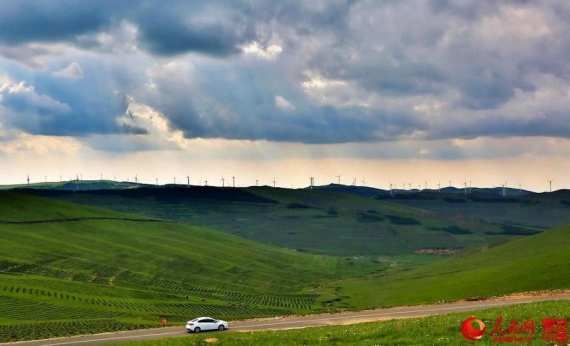
Photo shows the Zhangbei Grassland Highway, or known as the Grass Skyline, on the outskirts of the city of Zhangjiakou in north China's Hebei Province. Built in 2012, the 132-kilometer stretch of road is renowned for its intoxicating scenery. (Photo/people.cn)
A local government in north China's Hebei Province is under fire after it started charging drivers and their passengers to pass along a road known for its scenery.
From May 1, each driver and passenger has been required to pay 50 yuan (7.7 U.S. dollars) for the road connecting the prairie area of Zhangbei County and Chongli, a ski venue for the 2022 Beijing Winter Olympics, in the city of Zhangjiakou.
"The fee, based on the cost for cleaning and infrastructure construction and maintenance, is collected to better protect the environment," said the Zhangbei government in a written statement earlier this week.
Free entrance is only offered to residents and workers in the area.
Chinese law forbids tolls for roads other than expressways, but the Zhangbei government says the 50 yuan is a sightseeing admission charge, not a toll fee.
The Zhangjiakou government formally classified the road and its surroundings as a tourist resort on March 25, and Zhangbei held a hearing for the admission pricing on April 29, according to the statement.
In Chinese, the road is known as Caoyuantianlu, which translates as "the prairie road to paradise." Stretching 132 km, it has attracted a lot of sightseers over the past few years as stunning landscape photos taken from the road spread online.
According to official statistics, the road saw 330,000 drivers and passengers last year, and up to 6,000 vehicles a day in peak season.
Local residents have often suffered from traffic jams, littering and damaged grassland, but Zhangbei, officially classified by China's central government as a "poverty-stricken county," can not afford to maintain the road and develop it for tourists. Those costs run to millions of yuan every year, said Guo Zhiwei, deputy head of the county.
Despite the trouble brought by the sightseers, many residents would rather the government stop charging the fee, as it has limited the number of visitors and therefore reduced income from tourism.
Zhang Guo owns a guest house in Yehuling Village, near the start of the road in Zhangbei. He said May to October is peak tourism season for the area, but his guest house has only had 10 bookings in May.
Zhang spent 200,000 yuan opening the inn with 12 rooms and a restaurant last year. "The rooms were full during weekends and holidays from last July to September," he recalled.
Zhang said other villagers had opened guest houses, with investments up to 1 million yuan, but the admission fee has turned many tourists away, affecting their businesses.
Local media reported that about a third of vehicles did a U-turn in front of the toll gate during the May Day holiday.
Guo would neither confirm nor deny that, only disclosing that 7,000 people paid to access the road in the three days, bringing a total revenue of 340,000 yuan.
The public have divided opinions on the case.
"That's practically robbing," according to an online post from a driver who abandoned his trip on Caoyuantianlu when he discovered the charge.
"The beautiful landscape does not belong to the government, but to the people," said a Weibo user with the screen name "Ziyangjian."
Others believe the charge is justified in that it will help local tourism and protect the landscape.
"If tourists continue to swarm there without order, the place will be overloaded and it will quickly lose its beauty," wrote "Zhangbeizhengzong" on a Baidu forum about Zhangbei. The forum featured many photos of garbage piling up beside the road.
Liu Simin, a tourism expert with the China Society for Future Studies, said the charge is understandable for an impoverished county, but advised the government to keep the price reasonable to balance short-term financial shortages with long-term demand for development.
"Too high a price will eventually hurt the tourism business," Liu said.


















































